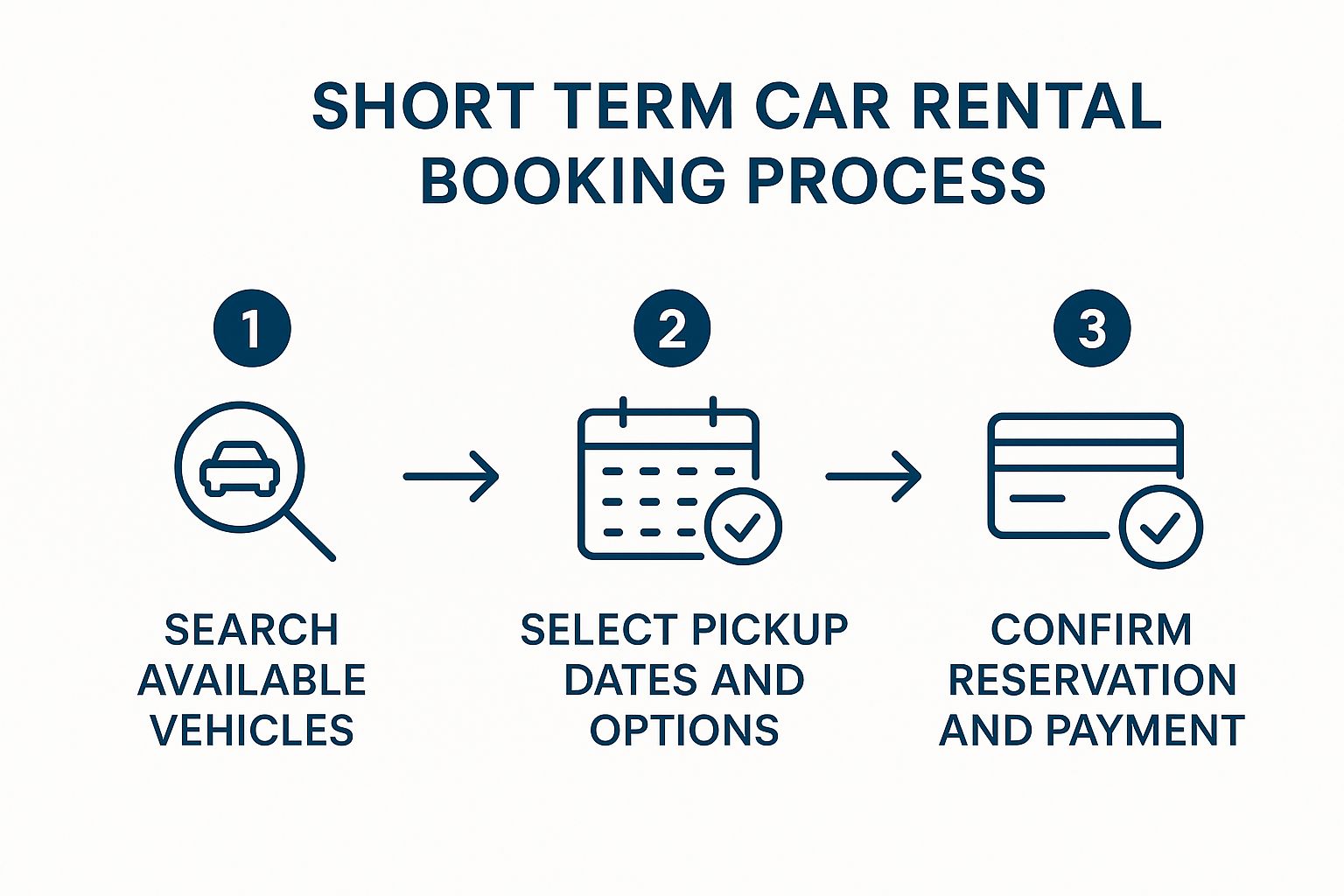Your Guide to Short Term Car Rental
- fantasma70
- Aug 2, 2025
- 13 min read
A short term car rental gives you a car when you need it, for just as long as you need it—whether that's for a few hours or a few weeks. It's your transportation on-demand, perfect for a weekend trip, a business meeting, or just to get around while your own car is in the shop. It's all about maximum flexibility without the headaches and costs of ownership.
What Exactly Is a Short Term Car Rental
Think of your transportation options like a toolbox. Owning a car is like having a trusty hammer—it’s great for everyday use, but it's not the right tool for every single job. A short term car rental, on the other hand, is like having access to a full set of specialized tools you can grab at a moment's notice.
Need to move a new bookshelf? Rent a pickup truck for the afternoon. Planning a drive up the coast? A convertible for the weekend makes it an adventure. That’s the whole idea behind renting a car short term: you get the perfect vehicle for what you’re doing, for exactly how long you need it.
This approach lets you sidestep the long-term costs and maintenance that come with owning a car, swapping them for pure convenience and freedom when you need it most. It's a simple, practical fix for dozens of common travel and logistical puzzles.
Your Transportation Toolkit in Action
Today’s travelers have needs that change from one day to the next, and a single mode of transport rarely cuts it. For more and more people, the flexibility of a short term rental has become a key part of their planning. This isn't just a feeling; the market shows it. The global short-term car rental market is on track to hit a value of around $85 billion by 2025, with more growth on the horizon. This boom is powered by a rise in tourism and a clear demand for more adaptable ways to travel.
A short term rental isn't just about getting from A to B. It's about having the right vehicle to make your trip better—whether that means closing a business deal or creating a vacation memory that lasts a lifetime.
Picking the right car is a huge part of the experience. It helps to know what's out there, from a small, fuel-efficient car for zipping around the city to a big SUV with room for the whole family. You can browse different car types to see what fits your next trip.
To really bring it home, here’s a quick look at the most common times when a short term rental is the smartest move.
When a Short Term Rental Is Your Best Bet
This table breaks down a few common situations where renting a car for a short period provides more value and convenience than other options.
Scenario | Why It Makes Sense | Ideal For |
|---|---|---|
Weekend Getaways | Escape the city without putting miles on your personal car. | Spontaneous road trips, visiting friends, or exploring nearby attractions. |
Business Travel | Ensures reliable and professional transportation between the airport, hotel, and meetings. | Impressing clients, managing a tight schedule, and maintaining a professional image. |
Car Repairs | Bridges the transportation gap while your primary vehicle is in the shop. | Commuting to work, running errands, and maintaining your daily routine without interruption. |
Special Occasions | Arrive in style with a luxury or specialty vehicle for a memorable event. | Weddings, anniversaries, reunions, or making a big impression. |
As you can see, a short-term rental is a versatile solution that adapts to your specific needs, giving you control and convenience right when you need it.
What Are the Real Benefits of Renting a Car Short Term?

Sure, public transport can get you to the big-name attractions, but a short-term car rental is what gives you the freedom to truly explore. It’s the difference between just seeing a place and actually experiencing it.
Think about it: you can pull over at a stunning viewpoint that isn’t on any map or stumble upon a fantastic local diner miles off the beaten path. That kind of spontaneity and freedom just isn't possible when you're tied to a bus or train schedule.
Beyond the sense of adventure, the financial side of things makes a lot of sense. If you live in a city or don't drive very often, the costs of owning a car—insurance, repairs, parking, and value depreciation—can be a huge drain. Renting a car turns all those constant costs into a simple, pay-as-you-go expense.
Financial Savvy and Peace of Mind
Renting is not just a smart money move; it also buys you a whole lot of security. This shift toward flexible, hassle-free travel is a big reason the U.S. car rental market was valued at nearly $150 billion and is expected to grow past $278 billion by 2030. It shows how much travelers, for both business and pleasure, are rethinking how they get around.
Choosing a short term car rental isn't just a transaction; it's a strategic decision. You gain financial control and the peace of mind that comes from driving a professionally maintained vehicle backed by roadside assistance.
This means you can stop worrying about things like surprise breakdowns or that overdue oil change you've been putting off with your own car. Instead, you can put all your focus on enjoying the journey ahead.
The Right Car for Any Trip
One of the best parts of renting is getting to pick a car that perfectly fits the trip you have planned. This can make the whole experience so much better.
Coastal Drives: Imagine cruising down the coast for the weekend in a sporty convertible. That’s how you make memories.
Family Adventures: A roomy SUV gives everyone space to stretch out and has plenty of room for luggage and gear.
Business Trips: Arriving at a client meeting in a clean, elegant sedan helps you make a great first impression.
This kind of flexibility means you’re not stuck using the same car for every single occasion. You get to choose the perfect ride for the job, every single time. If you're looking for the right vehicle for your next trip, you can check out some of the latest car rental deals available to find an option that fits your budget and plans.
Who Can Actually Rent a Car?

Before you get too far into planning your trip, it's a good idea to make sure you actually qualify for a short-term car rental. The rules can feel a bit confusing, and the last thing you want is a surprise at the rental counter. Let’s walk through exactly what you’ll need to have in hand to get the keys.
First things first: you absolutely need a valid driver’s license. This seems obvious, but it means more than just having a license. It has to be current (not expired) and in good standing. This is the non-negotiable starting point for every rental agency out there.
You'll also need a credit card in the main driver's name. Rental companies use this as a security guarantee, placing a temporary hold on the card for the security deposit. This deposit is their safety net, covering any potential extra costs like unpaid tolls, a low fuel tank on return, or minor damages.
Understanding Age Requirements
This is where things can get tricky. Your age is one of the biggest factors determining if you can rent a car and how much it will cost. While the policies differ from company to company, a few industry standards usually apply.
The Minimum Age: Most major rental companies require drivers to be at least 21 years old. Some are even stricter, setting their minimum age at 25.
The Young Driver Surcharge: If you’re between 21 and 24, get ready for the “young driver fee.” This is a daily charge tacked onto your rental bill, meant to offset the higher statistical risk that insurance companies associate with younger drivers.
That fee isn't chump change, either. It can seriously inflate your total cost, so if you're under 25, you have to account for it in your travel budget.
What About Your License and Payment?
Having the right documents and a valid payment method is just as critical as meeting the age rules. Here’s a quick rundown of what to have ready.
For international travelers, an International Driving Permit (IDP) is a must-have. It’s not a license on its own, but it translates your home country's driver's license into several languages. You’ll need to show it right alongside your original license.
While you might find some locations that accept debit cards, be prepared for more hoops to jump through. They might require a larger security deposit, ask for proof of a return flight ticket, or even run a credit check on the spot. Honestly, using a credit card is almost always the easier, more universally accepted path for a short term car rental.
How to Book Your Rental Car Step by Step
Renting a car can sometimes feel like a chore, but it doesn't have to be. Once you get the hang of it, the process is actually pretty simple. With a little bit of planning, you can go from browsing options to holding the keys, all without the usual stress.
The trick is to just take it one step at a time. Think about what you need first, then find the right deal, and finally lock in your reservation. This simple approach helps you sidestep common mistakes, like ending up with a car that’s too small or getting surprised by hidden fees. It’s a reliable system that millions of people use every day. In fact, the car rental industry is expected to grow from around $90 billion to nearly $108 billion by 2029. That's a lot of happy travelers hitting the road.
This simple breakdown shows you just how easy the booking journey can be.

As you can see, it’s a logical flow: find what you need, pick the best one, and book it. Let's walk through it.
Step 1: Choose the Right Car and Location
Before you even start looking at prices, take a moment to think about your trip. What do you really need from a car? If you’re zipping around a city, a small, easy-to-park car makes the most sense. But if you're packing up the family for a long road trip, you'll be glad you opted for a roomy SUV. Don't just grab the cheapest deal—make sure the car fits your plans.
Where you pick up the car matters just as much. Airport locations are super convenient, but they often have extra surcharges. Sometimes, an office a short ride away in a nearby neighborhood can save you a good chunk of change. It’s always worth checking out different car rental locations to see what works best for your budget and schedule.
Step 2: Compare Prices and Understand the Extras
Once you have a car type in mind, it's time to hunt for the best deal. I recommend checking a few different rental websites to get a solid idea of the going rates for your dates. A pro tip: book as early as possible. Prices almost always creep up the closer you get to your trip, especially during holidays or summer vacation season.
Don’t get fixated on just the daily rate. The little details can make a big difference. Check the fuel policy (a ‘full-to-full’ option is usually the cheapest) and look closely at the insurance. You might already have rental coverage through your personal car insurance or credit card, which could save you a nice bit of cash.
Step 3: Finalize Your Reservation
You’ve found your car and a great rate—now it's time to make it official. Before you hit that 'confirm' button, give everything one last look.
Dates and Times: Are your pick-up and drop-off details correct? Being off by even a little can lead to late fees.
Driver Details: Make sure the main driver's name is spelled correctly and matches the credit card.
Total Cost: Scan the final price breakdown to make sure there are no surprise taxes or fees.
Once you confirm, you'll get a reservation number. I always suggest saving it to your phone and maybe even printing a copy. Having it ready makes the pick-up process go a lot smoother. Follow these steps, and you’ll be booking your next rental car with total confidence.
Tips for a Smooth and Stress-Free Rental
Alright, you’ve booked your short term car rental, and you're ready to hit the road. But before you even think about putting the keys in the ignition, there are a few things to do at the rental counter that can save you a world of headaches later. Think of this as your pre-flight check for your road trip.
Your first move should always be a thorough walk-around inspection of the car. This is your best and only chance to protect yourself from being charged for damage you didn't cause. Don't just give it a quick glance. Get up close and inspect every panel—look for dings, dents, scuffs on the bumpers, and scratches on the wheels. Don’t forget the windshield, either.
Pull out your smartphone and take pictures or a short video of the car's entire exterior. Make sure you get clear shots of any existing damage you find. This creates a timestamped visual record, which is your evidence if questions pop up when you return the vehicle.
Decoding the Paperwork and Policies
Before you drive off, take five minutes to actually understand the rental agreement. You don’t need to read every last word of the fine print, but knowing the key policies can prevent some seriously expensive mistakes.
The big one is the fuel policy. You’ll almost always encounter one of two options: "full-to-full" or "pre-paid."
Full-to-Full: This is the most common and usually the best deal. You get the car with a full tank of gas, and you just have to return it full. Simple. You get to buy your own gas and only pay for what you actually use.
Pre-paid Fuel: Here, you pay for a full tank of fuel upfront. It's convenient, sure, but you won't get a refund for any gas left in the tank. This only makes sense if you’re absolutely certain you’ll be running on fumes when you drop the car off.
Understanding these simple terms is crucial. Returning a car on a 'full-to-full' agreement with the tank half-empty can lead to refueling charges that are often two to three times higher than local gas station prices.
Handling Unexpected Road Bumps
Even with the best preparation, things can go wrong. A flat tire or a fender bender can happen to anyone, but knowing what to do ahead of time keeps a small problem from turning into a major crisis.
First, find the 24/7 roadside assistance number in your rental paperwork and save it in your phone right away. If you have a breakdown, pull over somewhere safe, switch on your hazard lights, and give them a call.
If you get into an accident, your first priority is safety. Check on everyone involved and call for emergency services if anyone is hurt. Then, contact the police to file an official report, and after that, call the rental agency to let them know what happened. Following these steps keeps you in control and ensures you handle the situation the right way.
Why Choose Cars4Go for Your Next Rental

Knowing what to look for in a short term car rental is half the battle. The other half is finding a company that actually follows through. At Cars4Go, we’ve specifically designed our service to eliminate the common headaches travelers face, making the whole process surprisingly simple and pleasant.
We started with a simple idea: booking a car shouldn’t be confusing. Our website is built for absolute clarity. The price you see is the price you pay—no hidden fees, no confusing charges tacked on at the last minute. This means you can plan your budget without worrying about unpleasant surprises when you get to the counter.
The Right Car and Support When You Need It
You also need the right tool for the job. Whether you’re zipping through Miami in a nimble compact or taking the family to the coast in a roomy SUV, we have a clean, modern, and reliable vehicle that fits. We take pride in our fleet, making sure every car is in top shape for your trip.
At Cars4Go, we connect our features directly to your needs. From complimentary amenities to flexible policies, our goal is to provide a rental experience that feels less like a transaction and more like a service designed just for you.
To make things even easier, we include extras that other companies often turn into expensive add-ons. We just think they should be part of the deal.
No Extra Driver Fees: Want to share the driving? No problem. We won’t charge you extra for adding another driver to the rental.
Free Essential Add-Ons: Traveling with a child or exploring a new area? We provide car seats and GPS units at no extra cost.
Unlimited Miles in Florida: Feel free to explore every corner of the Sunshine State without the stress of mileage limits.
Our help doesn’t stop once you have the keys. We know that questions can pop up or plans can change, so our customer support team is always just a phone call or a WhatsApp message away. It’s this combination of a great fleet, straightforward pricing, and real human support that makes Cars4Go a genuinely traveler-friendly choice for your next rental.
Common Questions About Short Term Car Rentals
Even with the basics down, a few nagging questions always seem to pop up just before you click "book." Getting these sorted out is the final piece of the puzzle, ensuring your rental experience is smooth, confident, and doesn't hit your wallet with surprises. Let's walk through them.
Do I Need the Extra Insurance at the Counter?
Honestly, not always. Before you even head to the rental desk, a little bit of homework can save you a lot of money.
First, give your personal auto insurance provider a quick call. You might be surprised to find that your existing policy already covers rental cars, so you're protected from the get-go. After that, check the perks of the credit card you plan to use. Many premium credit cards include secondary rental car insurance, which is a fantastic benefit. Knowing what you're already covered for is the best way to sidestep paying for pricey, redundant insurance. But if you find you don't have coverage, grabbing the rental company's Collision Damage Waiver (CDW) is a smart call for total peace of mind.
What Hidden Fees Should I Look Out For?
Most companies try to be upfront, but some fees can still sneak up on you if you're not paying close attention. A little vigilance goes a long way.
Keep an eye out for these common extras:
Young Driver Fees: If you're under 25, expect a daily surcharge.
Airport Surcharges: Picking up your car right at the terminal is convenient, but it often comes with a specific fee.
One-Way Fees: Planning to drop the car off in a different city? That'll usually come with an extra charge.
Add-On Costs: Things like GPS units, satellite radio, and child safety seats all add to your daily rate.
The big one to watch is the fuel policy. If you agree to a "full-to-full" plan but bring the car back with a half-empty tank, the refueling fees can be astronomical. Always, always review the itemized cost breakdown before you pay.
Can I Use a Debit Card to Rent a Car?
Yes, but it’s often a bigger hassle. While plenty of rental locations accept debit cards, the process is rarely as straightforward as using a credit card. If you plan to go this route, be ready for a few extra hurdles.
They might run a credit check on the spot, ask for proof of a return flight, or place a hefty security deposit hold on your account—we're talking several hundred dollars. Some agencies, especially those at airports, might not take debit cards at all. To avoid a major headache at the counter, always call the specific rental location ahead of time to confirm their debit card policy.
Ready for a rental experience that’s clear, convenient, and headache-free? At Cars4Go, we believe in transparent pricing and great service. Find your perfect ride today.



Comments